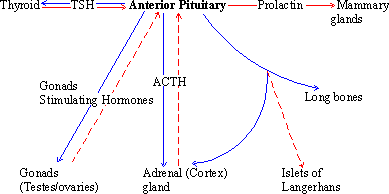The cells in the posterior lobe show
neurosecretory granules, prominent nuclei and polygonal supporting
neuroglial cells. This is because the posterior lobe stores the
hormones secreted by the neurosecretory cells of the hypothalamus.
(D) Pituitary Hormones
i.) Anterior lobe. The anterior lobe of
the pituitary secretes six hormones.
a) Thyroid stimulating hormone (TSH), or
thyrotropin, stimulates the secretion of thyroxin from the
thyroid glands.
b) Somototropic or growth hormone
controls growth of tissue, bone, muscles and internal organs, and
also influences metabolic processes. Hypersecretion in early life
gives rise to a condition called gigantism, and after the
growth period in adult life it results in acromegaly. In
acromegaly, excess secretion appears after long bones have ossified
and the growth continues only in certain bones, resulting in lengthening
of forelimbs, hindlimbs, and enlarged jaw and face. Hypofunction
during growth years results in pituitary infantilism,
a kind of dwarfism, in which an adult is not more than three
or four feet tall, and is usually sexually immature.
c) Follicle stimulating hormone (FSH) stimulates
the ovaries and testes. In females, it controls the development
of grafian follicles (ova). In males, FSH influences spermatogenesis,
i.e. production of sperm by the seminiferous tubules of the testes.
d) Adrenocorticotropic hormone (ACTH)
stimulates the adrenal cortex and regulates the secretion from the
adrenal glands.
e) Luteinizing hormone (LH) along with FSH,
is responsible for the growth of ovarian follicles, release of mature
ova, formation of the corpus luteum, production of progesterone
and regulation of menstrual cycle in females. In males, LH stimulates
the testes to secrete testosterone or ICSH- interestitial
cell stimulating hormone.
f) Prolactin initiates the secretion of
milk by the mammary glands after the birth of a baby. In the absence
of prolactin, milk secretion stops.

Interaction among pituitary and other endocrine
glands
(---------Responsible for feed back or
inhibition)
(---------Pituitary Hormones that stimulate
other glands)
ii)Intermediate lobe secretes only one hormone,
Melanophore Stimulating Hormone (MSH), or intermedin, which
controls skin pigmentation of many vertebrates. It makes the color
of the skin dark. However, it has no function in humans.
iii) Posterior lobe
a) Oxytocin causes contraction of the uterus
in females during childbirth and regulates lactation (release of
milk).
b) Antidiuretic hormone (ADH) or
Vasopressin stimulates the kidneys to reabsorb more water,
preventing excessive water loss by urination. Chronic deficiency
of ADH results in diabetes insipidus (polyuria), in
which the patient feels extremely thirsty and passes a large amount
of dilute urine.